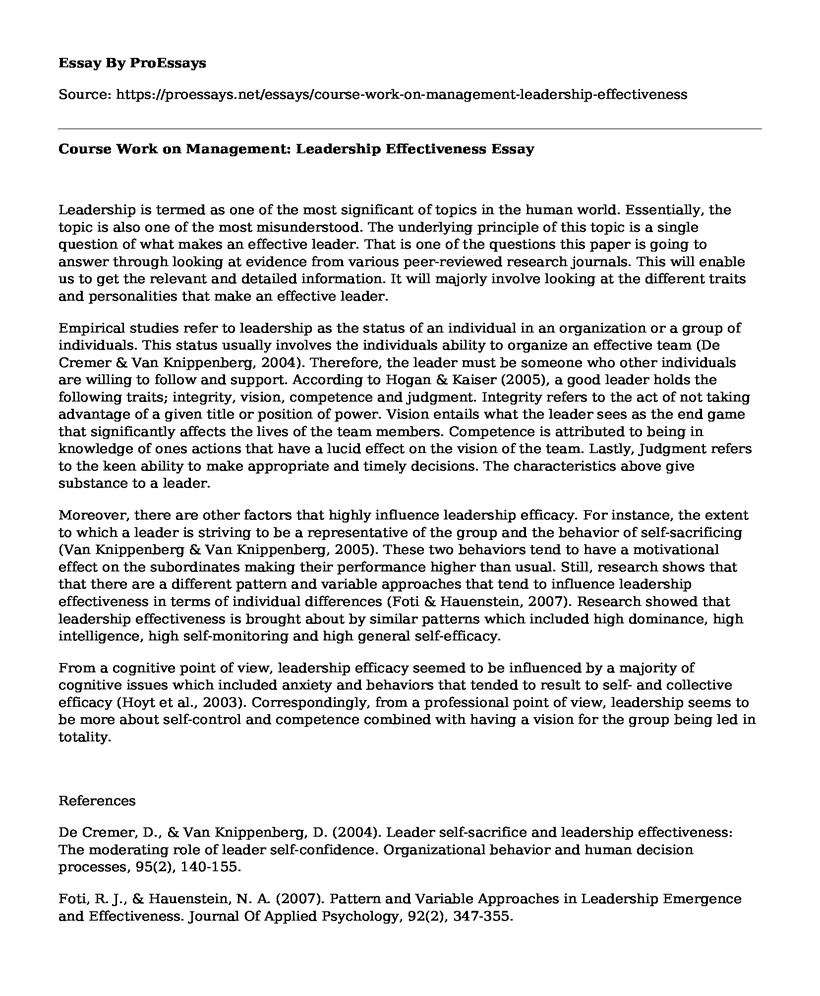Leadership is termed as one of the most significant of topics in the human world. Essentially, the topic is also one of the most misunderstood. The underlying principle of this topic is a single question of what makes an effective leader. That is one of the questions this paper is going to answer through looking at evidence from various peer-reviewed research journals. This will enable us to get the relevant and detailed information. It will majorly involve looking at the different traits and personalities that make an effective leader.
Empirical studies refer to leadership as the status of an individual in an organization or a group of individuals. This status usually involves the individuals ability to organize an effective team (De Cremer & Van Knippenberg, 2004). Therefore, the leader must be someone who other individuals are willing to follow and support. According to Hogan & Kaiser (2005), a good leader holds the following traits; integrity, vision, competence and judgment. Integrity refers to the act of not taking advantage of a given title or position of power. Vision entails what the leader sees as the end game that significantly affects the lives of the team members. Competence is attributed to being in knowledge of ones actions that have a lucid effect on the vision of the team. Lastly, Judgment refers to the keen ability to make appropriate and timely decisions. The characteristics above give substance to a leader.
Moreover, there are other factors that highly influence leadership efficacy. For instance, the extent to which a leader is striving to be a representative of the group and the behavior of self-sacrificing (Van Knippenberg & Van Knippenberg, 2005). These two behaviors tend to have a motivational effect on the subordinates making their performance higher than usual. Still, research shows that that there are a different pattern and variable approaches that tend to influence leadership effectiveness in terms of individual differences (Foti & Hauenstein, 2007). Research showed that leadership effectiveness is brought about by similar patterns which included high dominance, high intelligence, high self-monitoring and high general self-efficacy.
From a cognitive point of view, leadership efficacy seemed to be influenced by a majority of cognitive issues which included anxiety and behaviors that tended to result to self- and collective efficacy (Hoyt et al., 2003). Correspondingly, from a professional point of view, leadership seems to be more about self-control and competence combined with having a vision for the group being led in totality.
References
De Cremer, D., & Van Knippenberg, D. (2004). Leader self-sacrifice and leadership effectiveness: The moderating role of leader self-confidence. Organizational behavior and human decision processes, 95(2), 140-155.
Foti, R. J., & Hauenstein, N. A. (2007). Pattern and Variable Approaches in Leadership Emergence and Effectiveness. Journal Of Applied Psychology, 92(2), 347-355.
Hogan, R., & Kaiser, R. B. (2005). What we know about leadership. Review of general psychology, 9(2), 169.
Hoyt, C. L., Murphy, S. E., Halverson, S. K., & Watson, C. B. (2003). Group leadership: Efficacy and effectiveness. Group Dynamics: Theory, Research, and Practice, 7(4), 259.
Van Knippenberg, B., & Van Knippenberg, D. (2005). Leader self-sacrifice and leadership effectiveness: the moderating role of leader prototypicality. Journal of Applied Psychology, 90(1), 25.
Cite this page
Course Work on Management: Leadership Effectiveness. (2021, Jun 18). Retrieved from https://proessays.net/essays/course-work-on-management-leadership-effectiveness
If you are the original author of this essay and no longer wish to have it published on the ProEssays website, please click below to request its removal:
- Managing Exchange Rate Risk Through Hedging - Paper on Finance and Investments
- Essay on Managing Operational Expenses
- Economic Implications of Cloud Computing Essay Example
- Emotional Intelligence and The Influence on Leadership Decision-Making Paper Example
- 83% Open-Minded: My Personality Traits Revealed - Essay Sample
- Paper Sample on Test Reliability and Validity: Ensuring Accurate Results
- Project Management in Energy Industry: Streamlining Departments - Free Essay Example







